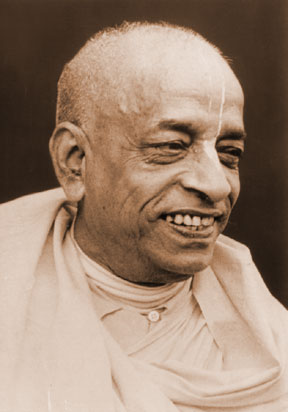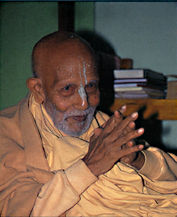
Sri Caitanya Mahaprabhu instructed Srila Sanatana Gosvami that a most essential element of Sadhana Bhakti is guru-padasraya — one must take shelter at the feet of a qualified guru. Without this shelter one's devotional activities will not lead to pure devotional service (Uttama-Bhakti).
guru-padasraya, diksa, gurura sevana
sad-dharma-siksa-prccha, sadhu-marganugamana
“On the path of regulative devotional service, one must observe the following items: (1) One must accept a bona fide spiritual master. (2) One must accept initiation from him. (3) One must serve him. (4) One must receive instructions from the spiritual master and make inquiries in order to learn devotional service. (5) One must follow in the footsteps of the previous acaryas and follow the directions given by the spiritual master."
(Cc. Madhya 22.115)
 Srila A.C. Bhaktivedanta Swami Prabhupada, has written in the introduction to the Nectar of Devotion (a summary study of Bhakti-rasamrta-sindhu) that, "Without initiation by a bona-fide spiritual master, the actual connection with Krsna consciousness is never performed." One should understand that it is essential that anyone serious about taking up the process of Krsna consciousness, do so under the direction of a bona-fide spiritual master.
Srila A.C. Bhaktivedanta Swami Prabhupada, has written in the introduction to the Nectar of Devotion (a summary study of Bhakti-rasamrta-sindhu) that, "Without initiation by a bona-fide spiritual master, the actual connection with Krsna consciousness is never performed." One should understand that it is essential that anyone serious about taking up the process of Krsna consciousness, do so under the direction of a bona-fide spiritual master.
The same essential elements mentioned in the guru-padasraya verse as to one's relationship with their spiritual master are also mentioned in Bhagavad-gita 4.34 as pranipata (offering proper respect to the spiritual master), pariprasna (inquiring submissively of the guru with devotional questions) and seva (offering service to the guru).
tad viddhi pranipatena
pariprasnena sevaya
upadeksyanti te jnanam
jnaninas tattva-darsinah
"Just try to learn the truth by approaching a spiritual master. Inquire from him submissively and render service unto him. The self-realized souls can impart knowledge unto you because they have seen the truth."
 The sincere devotee who takes shelter in this way is assured of success in their devotional practices. Such assurances are found many places in sastra, such as Bhagavad-gita, 18.65.
The sincere devotee who takes shelter in this way is assured of success in their devotional practices. Such assurances are found many places in sastra, such as Bhagavad-gita, 18.65.
man-mana bhava mad-bhakto
mad-yaji mam namaskuru
mam evaisyasi satyam te
pratijane priyo ’si me
"Always think of Me, become My devotee, worship Me and offer your homage unto Me. Thus you will come to Me without fail. I promise you this because you are My very dear friend."
Tad-vijnanartham sa gurum evabhigacchet: [MU 1.2.12] in order to understand the transcendental science, one must approach the bona fide spiritual master.
yasya prasadad bhagavat-prasado
yasyaprasadan na gatih kuto ’pi
dhyayan stuvams tasya yasas tri-sandhyam
vande guroh sri-caranaravindam
"By the mercy of the spiritual master one receives the benediction of Krsna. Without the grace of the spiritual master, one cannot make any advancement. Therefore, I should always remember and praise the spiritual master. At least three times a day I should offer my respectful obeisances unto the lotus feet of my spiritual master." (Gurvastakam 8)
The earnest aspirant of pure devotional service, who eagerly accepts the instruction of their guru as their life and soul and who is ready to engage in any devotional service as requested will surely achieve success.
Srila Viswanatha Cakravarti Thakura in his commentary on the Bhagavad-gita verse vyavasayatmika buddhir / ekeha kuru-nandana (2.41) states that it is the duty of a disciple to strictly follow the orders of his spiritual master.
Viswanatha writes as follows: "The instructions that my gurudeva has given me about sravanam, kirtanam, smaranam, pada-sevanam, etc. of Sri Bhagavan are my very sadhana, my very sadhya and my very life. I am unable to relinquish them in either the sadhana stage or in sadhya. My single desire and only engagement is to follow them. Besides this, I have no other desire or engagement, even in my dreams. There is no loss for me, whether by following these instructions I attain happiness or misery, or whether my material life is destroyed or not."
Pure devotional service has been defined by Srila Rupa Gosvami in the Bhakti-rasamrta-sindhu as krisnanu-shilanam, actively serving Krsna and all that is related to Krsna with a genuine liking and relish in a way that is agreeable or pleasing to Krsna (anukulyena) and without any motives other than the desire for Bhakti itself, and without adulteration with desires for gain in the way of material benefit, fruitive activity, knowledge or yogic realization ( jnana-karmady-anavritam).
This means that we cannot taint this service with our own mentality or desires, rather we must embrace that which is coming to us from above. The guru is the direct representative of the Lord and as such his instructions are non-different from those of the Lord. He does not mention anything not mentioned in the authorized scriptures nor by his predecessor acaryas. Narottama Dasa Thakura states that such instructions will not differ from those of the saintly persons and the scriptures.
sadhu-sastra-guru-bakyacittete kariya aikya
satata bhssiba prema-majhe
"Making the words of the guru, sadhus, and çastras one with my heart, I constantly float and swim in the ocean of pure love." (Prema-bhakti-candrika 1.9)
We may wish to offer the results of our activities as devotional service, but one should realize that pure devotional service means to serve according to the necessity of guru and Gauranga, not according to our choosing. First surrender, then serve.
In the beginning we are told to simply chant the Holy Name, dance in front of the Deities and take lots of prasadam. As we become more attracted and simultaneously convinced of the validity of the process we naturally inquire further. Then we find that we must follow so many more instructions to assure our proper advancement in Krsna consciousness. Experiencing the higher taste of the Holy Name and the association of devotees, a sincere sadhaka will naturally wish to follow these instructions.
As far as the regular daily chanting of the Maha-Mantra on beads is concerned, Srila Bhaktisiddhanta Sarasvati Thakura requested his disciples to chant sixty-four rounds daily. The only exception to this was when one was engaged in full temple service. Under such circumstances one must chant at least a minimum of four rounds. Mallika upavasa na — the mala must not fast.
For householders living outside the temple, Srila Bhaktisiddhanta also recommended that they chant sixty-four rounds a day. As a concession to present day necessity, we have received a similar instruction from Srila Prabhupada to strictly chant a minimum of sixteen rounds per day without fail. The essence of this instruction is to always chant the Holy Name, kirtaniyah sada hari. Therefore those who are serious devotees will always look to keep chanting continuously whenever they can.
Sadhana Bhakti
It is essential to maintain steadiness in ones sadhana, never slacking. Many verses from the Bhagavad-gita and Srimad Bhagavatam recommend this steadiness with such words as "nityam bhagavata sevaya." Krsnadasa Kaviraja Gosvami relates in the Caitanya-caritamrta that the sadhana of Raghunatha Dasa Gosvami, our prayojana-acarya (acarya showing the highest goal of sadhana-bhakti), was so much regulated that his steadiness could be compared to lines in a stone: yena pasanera rekha.
By following a regulated daily program one's mind becomes peaceful and one's capacity for concentration and absorbtion in their sadhana becomes more steady. Sri Caitanya Mahaprabhu recommends that the five most important processes of devotional service are
sadhu-sanga, nama-kirtana, bhagavata-sravana
mathura-vasa, sri-murtira sraddhaya sevana
“One should associate with devotees, chant the holy name of the Lord, hear Srimad Bhagavatam, reside at Mathura and worship the Deity with faith and veneration." (Cc. Madhya 22.128)
Here it is recommended that one live in a holy place - "mathura-vasa." This means, Vrndavana, Puri, Navadvipa or in a Gaudiya Vaishnava temple where Sri Caitanya Mahaprabhu and Radha-Krsna are worshipped. If one cannot live in a temple the next best thing is to make one's home into a small temple and daily maintain one's sadhana there. In order to stay fixed in the proper conception, maintain determination and avoid speculation it is of utmost importance to associate with devotees regularly (sadhu-sanga), especially with one's guru.
The sadhaka's sincerity is an essential ingredient for success. If one simply endeavors sincerely then Lord Krsna will help one by revealing from within essential knowledge for ones advancement — dadami buddhi yogam tam — To those who are constantly devoted to serving Me with love, I give the understanding by which they can come to Me. (Bg. 10.10)
Krsna also states in Bg. 9.22 that He carries what one lacks and preserves what one has — yoga ksemam vahamy aham. That is, we can use whatever capabilities we have in His service and that which we are lacking, whether it be understanding, knowledge or skills, He will supply from within if we simply endeavor sincerely. Within the instruction of the guru is contained the potency to carry out that instruction.
This is confirmed as follows: In his Amrta-pravaha-bhasya, Srila Bhaktivinoda Thakura explains that the spiritual potency is the essence of the pleasure potency. By these two potencies, one is empowered with devotional service. Lord Krsna Himself, or His representative, the unalloyed devotee, can mercifully bestow these combined potencies upon any man. Being thus endowed with such potencies, one can become an unalloyed devotee of the Lord.
Although austerity or tapasya can be beneficial for the advancement of the serious sadhaka, one must be careful to not attempt austerities which demand more than one's adhikari can support. That is, one must be sufficiently advanced in realization and spiritual standing so that this tapasya is not artificial. Our goal is to please our guru and Gauranga, so it is recommended by Srila Rupa Gosvami that real renunciation is to accept anything for the service of the Lord which can be used properly in His service — yukta vairagyam ucyate. To reject something as material, when it could be used in the Lord's service, is vairagyam phalgu kathyate, false renunciation.
anasaktasya visayan yatharham upayunjatah
nirbandhah krsna-sambandhe yuktam vairagyam ucyate
prapancikataya buddhya hari-sambandhi-vastunah
mumuksubhih parityago vairagyam phalgu kathyate
“When one is not attached to anything, but at the same time accepts everything in relation to Krsna, one is rightly situated above possessiveness. On the other hand, one who rejects everything without knowledge of its relationship to Krsna is not as complete in his renunciation.” (Bhakti-rasamrta-sindhu 2.255–256)
In the Srimad Bhagavatam it is recommended that one undergo a life of austerity, starting with Brahmacarya.
tapasa brahmacaryena samena ca damena ca
tyagena satya-saucabhyam yamena niyamena va
deha-vag-buddhijam dhira dharmajnah sraddhayanvitah
ksipanty agham mahad api venu-gulmam ivanalah
"To concentrate the mind, one must observe a life of celibacy and not fall down. One must undergo the austerity of voluntarily giving up sense enjoyment. One must then control the mind and senses, give charity, be truthful, clean and nonviolent, follow the regulative principles and regularly chant the holy name of the Lord. Thus a sober and faithful person who knows the religious principles is temporarily purified of all sins performed with his body, words and mind. These sins are like the dried leaves of creepers beneath a bamboo tree, which may be burned by fire although their roots remain to grow again at the first opportunity." (Bhag. 6.1.13-14)
It is also stated in the verse following this one that the essential ingredient is "kecit kevalaya bhaktya" unalloyed devotion.
kecit kevalaya bhaktya vasudeva-parayanah
agham dhunvanti kartsnyena niharam iva bhaskarah
"Only a rare person who has adopted complete, unalloyed devotional service to Krsna can uproot the weeds of sinful actions with no possibility that they will revive. He can do this simply by discharging devotional service, just as the sun can immediately dissipate fog by its rays." (Bhag. 6.1.15)
Austerity without devotion is simply a disturbance and will not produce any positive benefits. Indeed, too much austerity will make the heart hard. We need only look to the Mayavadi sannyasis, who although very austere, do not exhibit the qualities of saintliness.
The process is perfect, and the result (krsna-prema) is guaranteed if we follow it. Should the sadhaka's practice be lacking, we should not blame the process, only one's sincerity.
